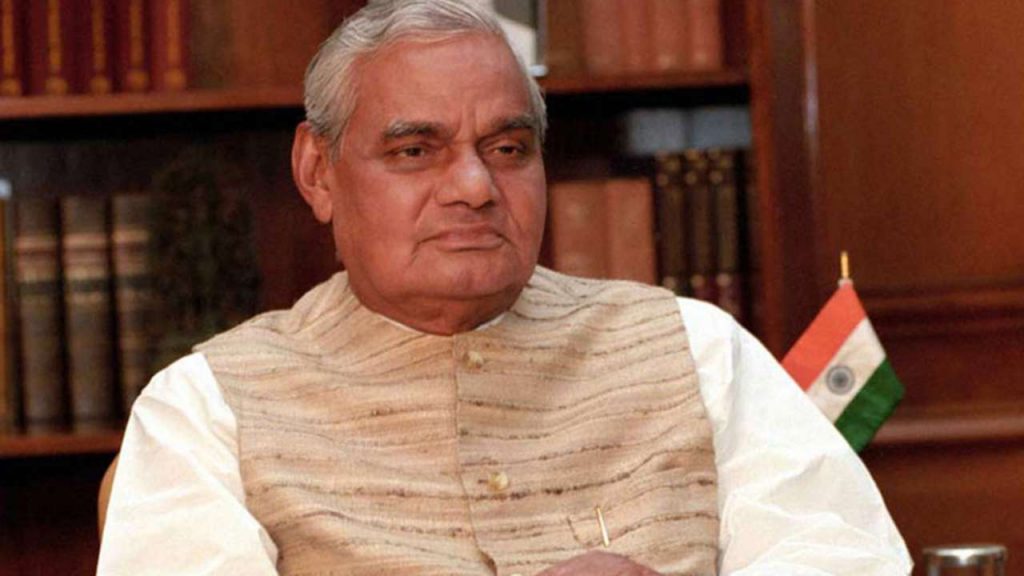December 25, 1924: Atal Bihari Vajpayee was born to Krishna Bihari Vajpayee, a schoolteacher and poet, and Krishna Devi in Gwalior as their second child. He attended the Saraswati Shishu Mandir and later Victoria College. He graduated with distinction in Hindi, English and Sanskrit following which he pursued postgraduation at DAV College, Kanpur, in Political science. He participated in India’s struggle for freedom even as a student and edited several nationalist Hindi newspapers.
1951: Vajpayee became associated with Bharatiya Jana Sangh (BJS), a right-wing political party founded by Syama Prasad Mookerjee,. He became a loyal follower of Mookerjee and supported him during his fast-unto-death in Kashmir in 1954.
1957: Vajpayee was elected to the Lok Sabha for the first time from Balrampur in Uttar Pradesh. He proved himself as an excellent orator
1968: Vajpayee was made the national president of the Jana Sangh following the death of Deendayal Upadhyaya. Over the next few years he worked with Nanaji Deshmukh, Balraj Madhok and Lal Krishna Advani to develop the Jana Sangh.
1977: Bharatiya Jana Sangh, Bharatiya Lok Dal and the Socialist Party amalgamated to form the Janata Party. This party won the general elections and Vajpayee was appointed the minister of external affairs in Prime Minister Morarji Desai’s government.
1979-1980: Janata Party was dissolved following the resignation of bMorarji Desai’s resignation and Vajpayee, in collaboration with Lal Krishna Advani and Bhairon Singh Shekhawat formed the Bharatiya Janata Party (BJP) in 1980 and became the party’s first president.
1984-1989: The BJP was reduced to just 2 seats in the 1984 elections but rose to win 88 seats in the next parliamentary elections in 1989.
1991-1995: The BJP emerged as the principal ooppsition by winning 120 seats in 1991. Vajpayee became the leader of the opposition in parliament in 1993 and in November 1995, he was declared the party’s prime ministerial candidate at the BJP conference in Mumbai.
May 1996: BJP emerged as the single largest party in the Lok Sabha and Vajpayee was sworn in as the Prime Minister but he had to resign after 13 days as the BJP could not obtain a majority.
1998: Vajpayee was again sworn in as Prime Minister in 1998 after the BJP emerged as the single largest party and formed the National Democratic Alliance (NDA). This government lasted for little over a year when fresh elections were held.
May 1998: India conducted the second underground nuclear test at Pokhran under Vajpayee’s leadership, just a month after the government came to power.
July 1999: India fought a war with Pakistan to defeat an attempted incursion by Pakistani military-backed insurgents into Indian territory at Kargil between May and July 1999. The BJP-led NDA again emerged as the largest political alliance in the 1999 general elections in the wake of the Kargil War victory. Vajpayee was sworn in a third time as the prime minister of India in October 1999.
March 2000: US President Bill Clinton paid a state visit to India. The visit was viewed as significant in improving the India-US foreign trade and economic relations.
2001: Vajpayee the Pakistani President Pervez Musharraf to India with a view to improve Indo-Pak relations. He also launched Sarva Shiksha Abhiyan, for universalisation of elementary education. The same year in December, Parliament House in New Delhi was attacked by Pakistan-trained terrorists. The Prevention of Terrorism Act, 2002 (POTA) was enacted in the aftermath of the attack.
2002-2003: Economic reforms initiated by the government resulted in record growth rate of 6-7 per cent in GDP.
2004-2005: Vajpayee resigned as Prime Minister after Congress emerged as the single largest party in the general elections. He announced retirement from active politics in 2005 and didn’t contest the 2009 parliamentary elections.
TO HIS CREDIT
# Nuclear tests conducted in 1998.
# National Highways Develop Project (NHDP) and Pradhan Mantri Gram Sadak Yojana (PMGSY)
# Economic reforms and privatisation campaigns he brought about during his tenure as the Prime Minister of India.
# Kargil War
# Padma Vibhushan, the second highest civilian award, bestowed in 1992 for distinguished contribution in public affairs
# Best Parliamentarian Award in 1994.
# Bharat Ratna in 2014
FAILURES:
# December 24, 1999: When militants of Harkat-ul-Mujahideen, a Pakistan-based extremist group, hijacked Indian Airlines Flight 814 (IC814) over Indian airspace and took the plane to Kandahar in Afghanistan, the government led by Vajpayee agreed to release three militants in exchange for the lives of the passengers on board the plane. These three militants later went on to execute the 9/11 attacks, the kidnap and murder of Daniel Pearl and the 2006 Mumbai terror attacks.
